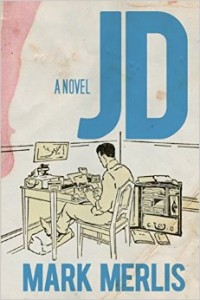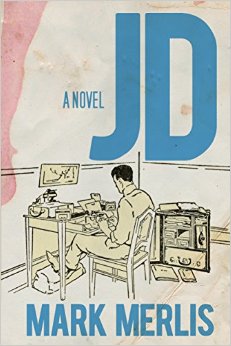 JD: A Novel
JD: A Novel
by Mark Merlis
Terrace Books. 272 pages, $26.95
Yet again, Mark Merlis has written a deeply satisfying novel, one whose voices continue to echo in your head long after you’ve finished reading it. Merlis’ fourth novel may be his most shocking yet, touching as it does on incestuous desire, but it also revisits his preoccupations with the gay past, first explored in 1994’s American Studies. In the first novel Merlis explored the world of McCarthyist America, when homosexuality became conflated with Communism as an existential threat, sufficient to lead “men like that” to shoot themselves. In JD he moves forward almost two decades into the 1960s, thus creating—along with his 2004 novel Man About Town—a kind of trilogy of American gay life.
JD moves across several decades, as Martha, the widow of once renowned author Jonathan Ascher, is approached by a potential biographer of her husband, a meeting which in turn leads her back to her husband’s diaries from the 1960s. Jonathan died not long after the death of their son Mickey, who was drafted to fight in Vietnam and died soon after, not as a war hero but from a heroin overdose. Now Martha, herself moving toward death, is forced to confront the realities of a marriage held together by inertia and mutual, unexpressed love for their son.
Or perhaps it’s not unexpressed: Jonathan’s diaries bring double revelation, both about the extent of his homosexual sorties and about his constant longing to become close to their son. The main strength of the book is in the way Merlis allows both characters to reveal themselves, neither of them in ways that are particularly likable. Jonathan is self-righteous, self-important, self-pitying, ready to take offense at everyone; the book takes its title from his one successful novel, which for a time seemed to make him famous, after which he never managed to write anything of significance.
Self-pity is also an affliction for Martha, who seems to have spent her life regretting her marriage. She is deeply homophobic, though in ways that are hardly surprising given the number of nights her husband was out cruising the bars, parks, and tearooms. Martha—is the name a conscious reference to Who’s Afraid of Virginia Woolf??—is bitter, unsatisfied, ever mourning the loss of her son and perhaps her husband, and very aware of aging alone. But while Martha is the narrator of the novel, the real disclosures come not from her but from the long dead Jonathan, whose diaries from the 1960s allow Merlis to depict a world of self-loathing in which Jonathan increasingly abases himself. And that is the right verb, as his most common sexual position appears to be on his knees. Of one trick he remarks: “that I was kneeling in piss seemed to him a logical sequel [sic]of what we had been up to. (Or he up to, I down to.)”
All of Merlis’ novels are anchored by an awareness of the mismatch between political opinions and personal life, so while Jonathan sees himself as profoundly radical—at one point he fears he’s being displaced by Herbert Marcuse as a guru for young radicals—he finds the idea of organizing around one’s sexuality both threatening and perhaps slightly comical. This is not an uncommon view; Gore Vidal would make jibes about the futility of gay politics, and the Australian Nobel novelist Patrick White was scathing in his attitudes toward a politics based on sexual identity.
Jonathan’s diaries acknowledge Stonewall, but it comes too late to change his life, and he echoes an old Marxist position that “the fellatio party” will not really challenge the techno-capitalist order. There is a resistance, not uncommon at the time, to giving up the furtiveness of a shadow world of sex and bars, even as he rails against it. But, as the diaries reveal, his deepest feelings are for his son, who arouses both filial and erotic desires.
Mickey, then, is the central character who holds Martha and Jonathan together, but we never see the world through Mickey’s eyes, and he is as damaged as his parents, as unable to construct a fully satisfying life. The bonds that hold the three of them together also help destroy Mickey, but Merlis is too good an author to spell this out. One finishes JD with a sense of both satisfaction and frustration, because it is a novel that weaves together the casualties of family and unaccepted sexual desires into a remarkable, if depressing, story of the U.S. in an era of huge social change.
_____________________________________________________
Dennis Altman’s most recent book is The End of the Homosexual?
(Univ. of Queensland Press, 2013).






